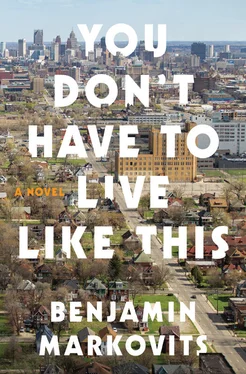“I regulate my own temperature. If I get cold, I run in place.”
But he ate a lot, a slice of pizza, a couple of chili dogs, people were selling popcorn and he ate that, too. Eventually we walked over to the game, which was about a ten-minute walk, part of a stream of people, not exactly marching but dutifully going along, milling and pushing forward, but in high spirits. The Lions had sucked for about ten years, the season before they hadn’t won a game, and nobody expected much. But people looked happy, everybody had a good time.
Mostly what we talked about was football. Detroit was playing the Browns, old rivals. Cleveland stunk, too, though not as bad as Detroit. I heard a lot of Cleveland jokes outside the stadium, on the walk over. Thousands of Browns fans had made the three-hour drive. But the queues were good-natured, and I was used to this kind of depressed kidding but also borderline angry cheerfulness, from growing up outside New Orleans and being around Saints fans. I didn’t care much about football, but I mentioned the brown baggers to Ernie to pretend like I did, like I used to be one of them — guys who showed up at the Superdome wearing brown paper bags over their heads.
I said, “You guys need some brown bags, it’s brown-bag time.”
Detroit was like one and eight going into the game. Cleveland had won maybe three games. “What is this, the toilet bowl?” I said. Nolan had bought everybody a round of Jägermeisters at the tailgate. It was eleven thirty in the morning and I felt good.
“This asshole right here needs to shut up, that’s what he need to do,” Marcellus said.
Then the game started. Cleveland knocked in a field goal and then Detroit got one back.
“It’s going to be one of those six-three games,” I said. “Nine-six, twelve-nine, that kind of game.” Then Cleveland scored three straight touchdowns, in about ten minutes, boom boom boom, and it looked like just another winter afternoon in Detroit, with the scoreboard ticking over, seventeen to three, twenty-four to three, one of those days. Somehow getting beat like that made everybody relax. They didn’t have to care anymore.
But Detroit had this kid from Georgia named Stafford, a first-year guy, playing QB. Marcellus called him the pretty girl — he was going to be good. “Come on, pretty girl,” he said, “put it in there,” stuff like that. And Stafford started mixing it up, throwing it all over the field, guys made catches, guys broke tackles, it was two shitty teams going at it, and by halftime Detroit was only down three.
Ernie’s box had heating and a minibar, and we were drinking the whole time and Ernie kept sending Taequan out to get the waitress. “Tell him what you want,” Ernie told me, “get what you want, this whole thing’s on me.”
I said to him, “You’re a good man, Ernie, thank you very much.” But then the beer started talking for me and I asked him if he knew Nolan’s dead brother or who had killed him and how many people he had killed himself.
“Marcellus here’s your killer,” he said. “Ain’t that right, Marcellus? I’m just a businessman. I do paperwork.”
“Naw, don’t put that on me,” Marcellus said. “Don’t believe what he tell you. He’s cold-blooded.”
“You guys are just fucking with me, aren’t you?”
“If we was fucking with you, you’d be dead.”
Then the second half started and it was more, Come on, pretty girl, make babies. This is what Marcellus called touchdowns. Stafford threw a touchdown pass and then got sacked in his own end zone. Cleveland scored again and got the ball back. Detroit was down six, but stuffed the Browns on fourth down, and then there were two minutes left and the pretty girl had the ball in his hands and was driving the Lions downfield. “Come on, you white Georgia motherfucker,” Ernie said. “Be good.”
Stafford brought the Lions to the two-yard line and then got picked off in the end zone as time ran out. But there was a flag on the field and the play got called back. Stafford meanwhile lay flat on his back with the medical team poking at him. He took a hit on the last throw, but he got up and ran another huddle, and with no time left on the clock, dumped the ball into the tight end, a little behind him, so the guy had to spin around into open space. But he caught it anyway. Everybody went fucking crazy around me, including me, but we had to wait for the extra point to go crazy again and make it official. The Lions had won. It was the last game they won all year.
On the ride home, Taequan heard Nolan calling me Marny, and he said, “How come people call you Marny? Is it because you a bitch?” When I didn’t say anything, he said, “How come he laughing? How come he laughing when I call him a bitch?”
“Leave him alone,” Nolan said. “He’s all right.”
“I’m just saying, how come he got like a female dog name?”
“Because he’s my dog,” Nolan said.
He dropped everybody else off first, and when Ernie got out, I climbed through the gap between the seats and sat in front. We drove like that, not talking much, until we got back to Johanna Street. He parked in his own drive and I walked home.
Istarted hanging out with Clarence a little, too. Walter and Susie had finally got their license from human services, to run a children’s workshop out of their house. So every day, a couple of times a day, parents and nannies came by with their buggies and scooters. There was a morning session and an afternoon session. Mornings were mostly for toddlers, and afternoons became a kind of after-school drop-off for five- and six- and seven-year-olds. Susie sat down at the piano, I could hear her from upstairs, and taught the kids songs, while Walter did crafts with them, designing costumes and stage sets. He was good with his hands, and good at getting down on his hands and knees, which I wouldn’t have expected. They were going to put on a Nativity play and wanted to get it ready for just before Christmas.
By Thanksgiving I knew most of the songs myself, which drove me nuts. “Away in a Manger,” all of that. The religious element surprised me, too, but Susie was raised High Church Episcopalian, and Walter went along with her. How much he believed I don’t know. But he was very good with kids, patient, he got down to their level, all that lack of vanity or ambition or whatever you want to call it served him well here. Though I admit I also felt uncomfortable, seeing him on the floor with these small boys and girls, when what got him into this situation in the first place was his inappropriate response to a sixteen-year-old student in his class.
The kids who came were mostly from our neighborhood, mostly newcomer kids, but Mrs. Smith sometimes brought Clarence along, and if she was late picking him up, he waited upstairs with me. I let him watch TV (Nolan was strict about TV) and gave him a glass of milk and we got along fine.
One afternoon Tony Carnesecca dropped his son at my house, because Cris was teaching a prenatal yoga workshop and he had something to talk about with Robert James. Michael would only get in the way. It was just for an hour. So I sat him down in front of the TV and about an hour later Clarence came up because Mrs. Smith was late, so I got him a glass of milk and told him to sit down next to Michael.
Michael stood up to make room, and I said to him, “You don’t need to get up, there’s plenty of space on the couch,” and Michael said, “I don’t like chocolate people.” He was only three years old, he said it the way he might push away a plate of food, and Clarence, who was six, threw the milk in his face.
I said to Michael, “That’s not a nice thing to say, I want you to say sorry,” and then Tony walked in.
Читать дальше












